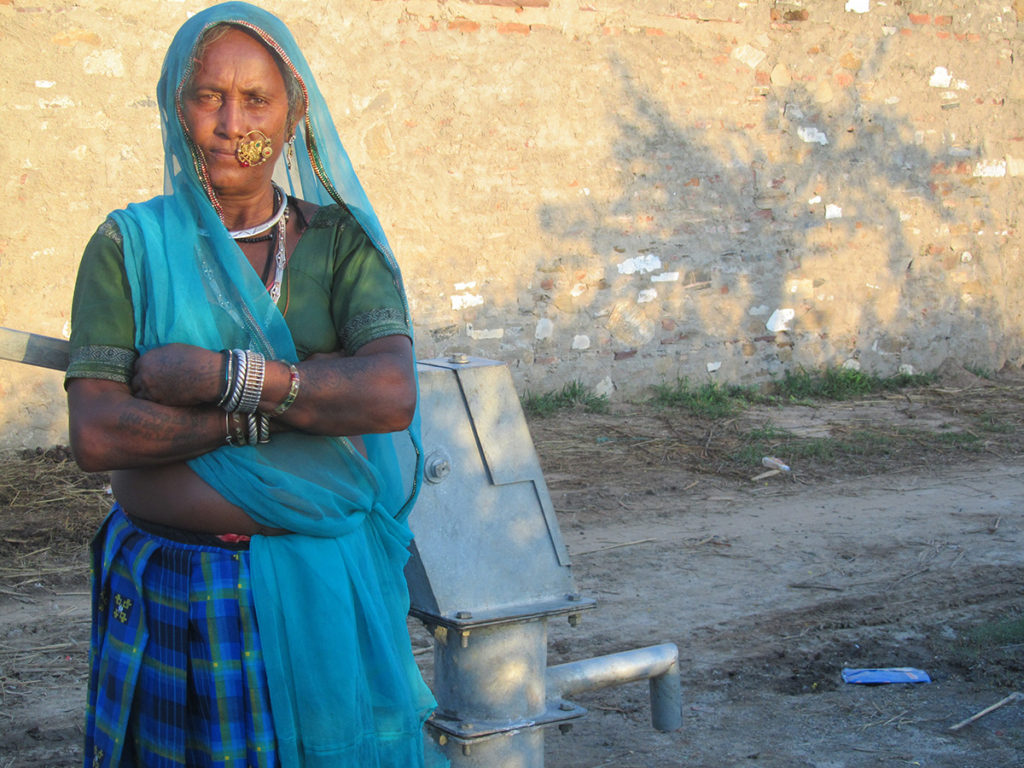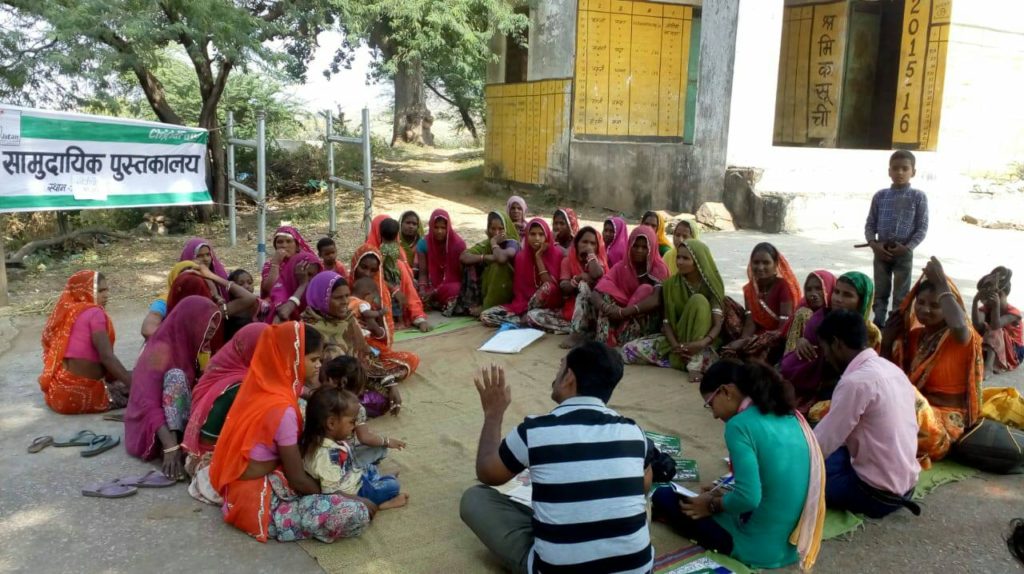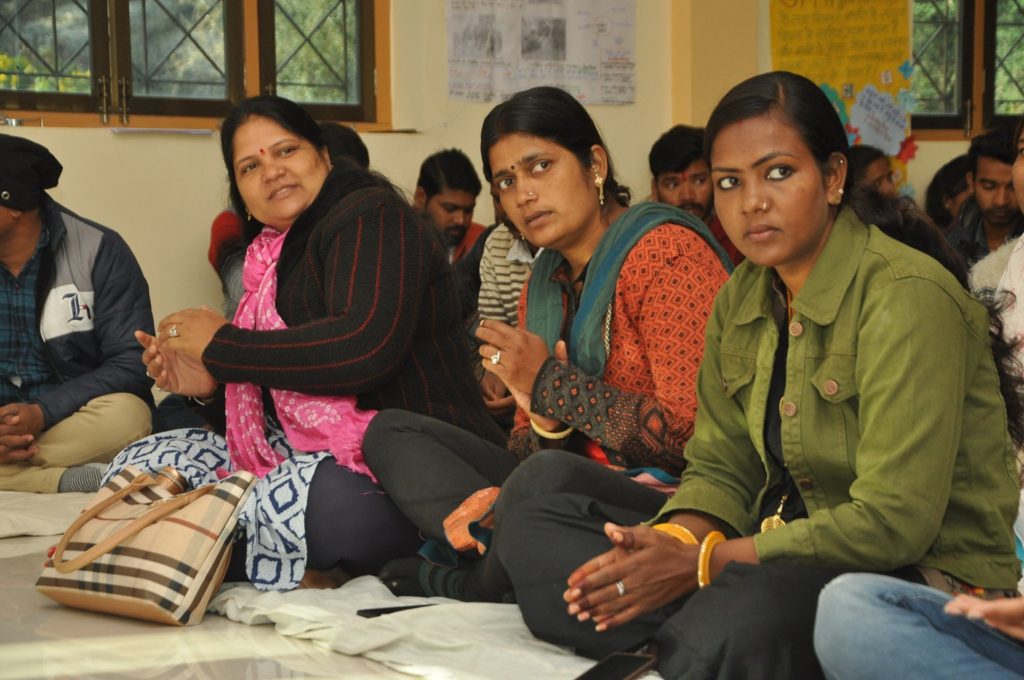Earlier these women had no contact to the outer world other than their husbands and now they rule their blocks and panchs like a lone wolf.
Rajasthan still struggles with gender inequity at grassroots, despite having a female Chief Minister at the helm for more than half of the last two decades. Their efforts at female empowerment proved to be inefficacious until non-governmental organizations (NGOs) like Jatan Sansthan arose. Their work has led to actual women empowerment by changing both – perception and power relations.
Jatan operates as one of the many executive arms of the Hunger Project, a US-based organization, working to eliminate hunger. Its premier project is Panchayati Raj, through which it professionally trains and strengthens the elected women representatives of Panchayats and Wards. Till date, it has worked with more than 600 representatives in districts Rajsamand, Udaipur, Thalawar and Bhilwada of Rajasthan.

The 73rd Constitutional Amendment in 1992 reserved one-third electoral seats of the Panchayats and Wards for women. Through it, the women did gain opportunities and rights on paper, but for all practical purposes, power continued to remain with the men. Hundreds of setbacks awaited these women before their share of power and even, self-respect.
In the initial post-amendment period, men had forced their wives to contest elections, then controlled them from behind the curtains. For these women, the first battle was to defeat the brute male subjugation they were not even aware of experiencing. This is where Jatan came to rescue, with workshops on gender equity and workers who practically infiltrated the lives of elected female office-bearers.
It is only in this decade that Jatan’s efforts resulted in women coming-out as independent leaders holding considerable vote-shares and opinionated decisions. However, these assertive women were still afar from victory. They still faced many discriminatory layers.
The first of them was the eternal misogynistic question, “How will a woman do men’s work?” They had to convince their family and society of their worth. They not only struggled against the society around them but also the very government which granted them this opportunity. Local bureaucrats gave more attention to male representatives while negating their female counterparts. Manju Aarya from Sadri in Rajsamand district spent most of her office-term in convincing the local officers to treat her as an equal. This was just the tip of the enormous patriarchal iceberg.
Until the start of the 21st century, women contested elections because they were forced. They were controlled by their husbands to the extent that they weren’t even called ‘Sarpanchs’. 2001 was the landmark year. After eight years of unwillingly working as elected members, they gained a better understanding of the outside world. Simultaneously, the government’s want for a better and equitable implementation of the amendment increased. It was also the year when Jatan started working on-field.
Jatan Sansthan and the Hunger Project adopted a two-pronged strategy for empowering female representatives. On one hand, they trained the female representatives and on the other, they tried to make the government officials empathetic towards gender equity. They established Mahila Jagruk Manch to reach villagers and Mahila Panch Sarpanch Sangathan to reach the bureaucrats.
After extensive workshops by Jatan, the bureaucrats now employ a different and friendlier approach towards the female office-bearers. It has become easier for women to work with bureaucracy than their male counterparts. The numerically fewer women are now seated ahead of men in General House Meetings to encourage them to speak more.

Jatan, with other executive organisations of the Hunger Project, worked extensively to develop the question, “Why not 50%?” regarding the reservation quota of women. With the support of elected female members, this was followed by memorandums and table-talks with senior bureaucrats.
In 2010, patriarchy bowed out and an amendment increased the reservation to 50% on all seats of Panchayat and Wards. Earlier, women had to contest just because of the reservation. But since the amendment, women have proved their impeccable skills and now train themselves for contesting, sometimes even the unreserved seats.
The female office-bearers in Panchayats and Wards have finally recognised their worth and became true societal leaders. Sumitra, a core member of Jatan hails the biggest change which Jatan brought is that of, “the belief of women in their agency.” This was brought with workshops focusing on how their position as office-bearers was special. This speciality was made tangible by nameplates which were placed on the desks and outside the homes of female office-bearers.
Seeing the physical proof of their position reinstated their belief in themselves. After years of ceaseless workshops, nameplates and female-oriented documentations, Jatan finally made women believe in their agency.
Previously husbands of the elected women were referred to as ‘Panch Sahab’ instead of calling the elected woman as ‘Panch Sahiba’. Now husbands of elected women do not warrant special attention and are even called ‘Sarpanch Pati’. Women now own their identity and agency. The husbands are identified by their wives instead of the other way round.
Coming one step forward, women representatives have started celebrating Women’s Day. It is a new thing for villagers but as women achieve greater feats, tackle difficult issues and succeed, the villagers celebrate it enthusiastically. Their support for female Sarpanchs is not limited to celebrating Women’s Day, it is a much more credible and permanent support with women now contesting on unreserved seats and even winning it against male candidates.
Comparing the society before and after 2001, Sumitra recounts the positive consequences like women voluntarily approaching Jatan, the emergence of young female office-bearers and how their new-brand of politics that mixes development with humanitarian reforms. Bharti compares the work of women with that of men by emphasizing how the former align economic development with humanitarian reforms instead of just focusing on economic developments. They have developed model Aanganwadis, opened Gender Resource Centers, RO Plants and in layman’s terms made living easier for women.

The elected women also use more of their monetary budget than their male counterparts. But that doesn’t mean unnecessary expenses. For instance in Gawardi village, Pushpa instead of constructing a new building for the health centre used an unused school building.
“They don’t focus on buildings, they focus on who is going to live there”, Bharti exclaims. Their brand of development is sustainable. Every minute thing is micro-managed by these women just like how they manage their households.
Women, now by-large independent, are still supported by their family. Panchayats in India, as a structure, cannot function without familial support lent to elected representatives. Furthermore, the issue of women being forced to contest elections hasn’t ended completely. Bharti, a core member of Jatan, believes that 3 out of 10 women contest on reserved seats because of familial pressure. However, once they come in contact with Jatan, even they understand their agency as elected office-bearers representing people and try to bring positive changes.
From female Sarpanchs hiding behind their husbands to doing supervising visits alone, it was a long journey for Jatan. Earlier, women could not imagine themselves working without the aid of men. This patriarchal mindset made them reject their agency. An inferior body-map existed inside female minds, one which made them alien to decisions taken without male validation. Jatan by far did the most difficult task. It re-created the identity of female office-bearers as position holding authoritative figures.
It taught them to question the patriarchal strands of their society. Working in its 20th year, Jatan has made a name for itself in Rajasthan, inside both the villages and the state bureaucracy.
When Jatan started working, it faced elected women representatives who didn’t talk to strangers, negated that they were elected representatives and let the husbands fulfil their duties. Now the elected women handle all their tasks by themselves, from communicating with government officials to attending Panchayat meetings. Earlier these women had no contact to the outer world other than their husbands, and now, they rule their blocks and panchs like a lone wolf.
“It seems like a thing of the past now,” Bharti says with a smile.
Article Credit: youthkiawaaz
